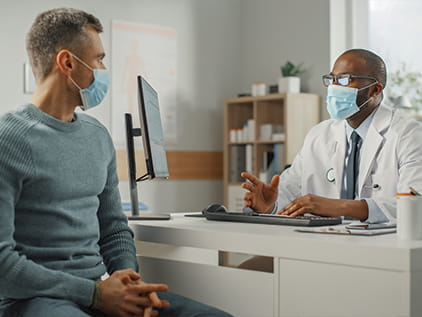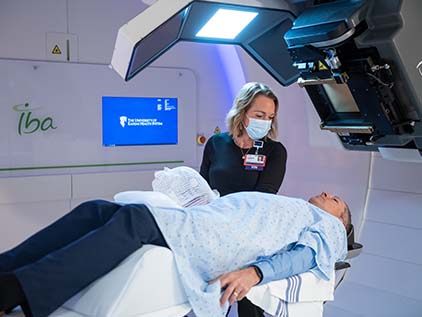Lung Cancer

More people die of lung cancer each year than of breast cancer, colon cancer and prostate cancer combined. Lung cancer is the second most common cancer in men and women.
However, lung cancer is also one of the easiest cancers to prevent. Most cases of lung cancer are caused by smoking. Other possible risk factors for lung cancer include:
- Age: The average age of diagnosis is 70
- Gender: Men are more likely to develop lung cancer than women
- Race: African American men are more likely to develop lung cancer
- Exposure to secondhand smoke
- Exposure to environmental toxins such as arsenic, asbestos, radon, radiation or radioactive dust
Early diagnosis and treatment for lung cancer are critical for improving survival rates. If you’ve been diagnosed with lung cancer and want a second opinion, we can help. Our thoracic oncology specialists provide comprehensive care to those with lung cancer and will help you understand your treatment options. We partner with you in care before, during and after treatment.
Lung cancer overview
Lung cancer starts in the tissue of the lung, usually in the cells that line the airways, invading nearby tissues and often forming tumors in hard-to-reach locations. Lung cancer can begin anywhere in the lungs and affect any part of the respiratory system.
Initial symptoms of lung cancer can be mild and easily missed, especially in the earliest stages. Because the lungs are large, tumor growth can go unnoticed for long periods of time before getting a correct diagnosis.
One way we achieve the earliest possible diagnosis is with the robot-assisted minimally invasive lung biopsy procedure. This FDA-approved robotics system can reach all 18 segments of the lungs ̶ even small nodules in distant spots ̶ and is expected to improve lung biopsy success rates from 60% to 90%. Improving our ability to obtain biopsies, especially from hard-to-reach areas in the lungs’ periphery, ultimately enhances our ability to deliver a diagnosis before the disease has advanced.
Like other cancers, lung cancer can spread (metastasize) to the lymph nodes and other areas of the body, including other organs. Lung cancer that originates in the lungs is called primary lung cancer.
The 2 main types of lung cancer are small cell and nonsmall cell. Doctors stage both types of lung cancer differently.
Nonsmall cell lung cancer
Most cases (about 85%) of lung cancer are nonsmall cell lung cancer. There are 3 types of NSCLC:
- Adenocarcinoma: Adenocarcinoma is the most common type of lung cancer.
- Squamous cell carcinoma: This type of lung cancer tends to grow toward the center of the lungs.
- Large cell carcinoma: Pathologists identify this type of lung cancer by its distinctive large, round cells.
When diagnosing NSCLC, doctors categorize cancer into stages based on whether the cancer has spread:
- Stage 1: Cancer is found only in one lung and hasn’t spread.
- Stage 2: Cancer has spread beyond the lungs into the nearby lymph nodes.
- Stage 3: Cancer has spread to the lymph nodes in the middle of the chest. If cancer has stayed on the same side of the lung where it started, it’s called stage 3A. Cancer that’s spread to the lymph nodes on the opposite side of the chest or higher than the collar bone is called stage 3B.
- Stage 4: Cancer cells have spread to both lungs, the area around the lungs or to other organs or different parts of the body.
Small cell lung cancer
Doctors diagnose much fewer people with SCLC than with NSCLC each year. Only 15% of lung cancer cases are small cell. Small cell lung cancer tends to grow faster than nonsmall cell. However, small cell lung cancer often responds better to chemotherapy.





Start your path today.
Your journey to health starts here. Call 913-588-1227 or request an appointment at The University of Kansas Cancer Center.